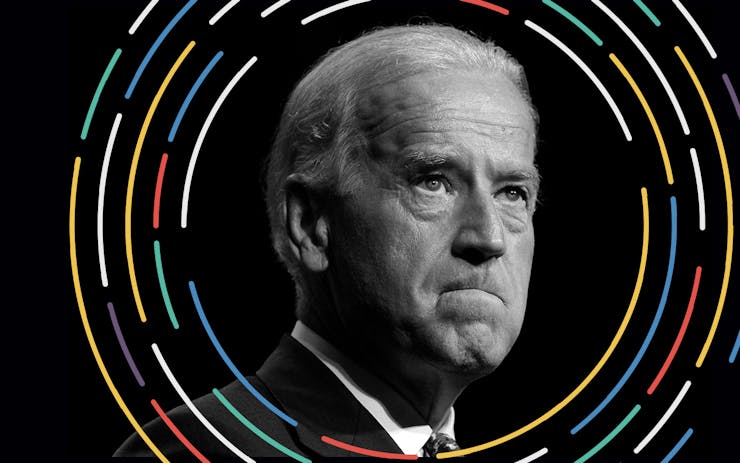Former Vice President Joe Biden, one of the few presidential candidates to oppose cannabis legalization, took a tentative half-step toward reform this week.
'Nobody should be in jail for smoking marijuana,' says the man who put them there.
“Nobody should be in jail for smoking marijuana,” Biden told a small local gathering of political supporters in New Hampshire on Tuesday.
It wasn’t much, but that simple statement represented a huge leap for Biden, one of the most ardent drug warriors of the past 30 years.
Jail ‘Em Joe
As author David Bienenstock laid out for Leafly earlier this year, Biden has long been a driving force behind America’s disastrous approach to drug policy. Biden helped create America’s out-of-control civil asset forfeiture system, worked hard to incentivize mass incarceration, pushed to adopt mandatory minimums, and was an early supporter of the militarization of the police.
On Thursday, Biden campaign spokesperson Andrew Bates clarified the candidate’s position.
“Vice President Biden does not believe anyone should be in jail simply for smoking or possessing marijuana,” Bates told CNN. “He supports decriminalizing marijuana and automatically expunging prior criminal records for marijuana possession, so those affected don’t have to figure out how to petition for it or pay for a lawyer.”
“He would allow states to continue to make their own choices regarding legalization,” Bates added, “and would seek to make it easier to conduct research on marijuana’s positive and negative health impacts by rescheduling it as a Schedule II drug.”
Was Biden Unable to Speak?
It’s not clear why Biden himself was unable to make that clarification—unless he considers the subject too unseemly to discuss in public.
By embracing decriminalization, Biden takes what many in the drug reform community consider the coward’s way out. Many states have adopted decriminalization measures, which don’t alter existing laws but simply lower penalties for cannabis offenses.
These half-steps leave law enforcement free to continue practicing racially biased policing tactics, using marijuana as a pretext to stop people of color as they go about their business. For what it’s worth, the ardently anti-cannabis group Smart Approaches to Marijuana (SAM) has often expressed support for decriminalization while actively lobbying to defeat measures that put decrim principles into action.
Biden’s position also threatens to downshift the public conversation about legalization, from broad national legalization to a consideration of concepts like re-scheduling cannabis to Schedule II. As defined by the Controlled Substances Act, Schedule II drugs have a high potential for abuse which may lead to severe psychological or physical dependence. Schedule II drugs include meth, cocaine, oxycodone, and fentanyl.
Primary Challengers
The prominence afforded to Biden by the mainstream media means his halfhearted pivot could overshadow the longtime cannabis leadership demonstrated by other Democratic candidates, some of whom have long been working the front lines of drug reform. Sen. Cory Booker introduced his Marijuana Justice Act years ago, when few had the courage to advocate for legalization. Sen. Bernie Sanders came out for full legalization during his 2016 presidential primary campaign (and had been an open supporter long before that). Beto O’Rourke got his start in politics by advocating for cannabis reform as a member of the El Paso City Council.
It’s a Generation Thing
Biden’s generation of mainstream Democrats seems to have a hard time coming to terms with legalization, though. During the 2016 presidential campaign, Hillary Clinton’s disdain for legalization was so pronounced that Leafly ran an item on her position under the headline, Clinton Vows Tepid Leadership on Cannabis.
Biden’s generation of Democrats seems to have a hard time coming to terms with legalization.
Last year, New York Gov. Andrew Cuomo was forced to change his prohibitionist position to favor adult-use legalization last year when Democratic challenger Cynthia Nixon revved up her campaign around the issue. But Cuomo’s true feelings about cannabis were revealed last week when he refused to lift a finger to support a legalization measure that’s gasping for air in the Legislature.
Similarly, California Sen. Dianne Feinstein altered her lifelong prohibitionist stance last year when pressed by a more progressive primary challenger. But once she was re-elected, Feinstein all but forgot her changed position.
Why Not Support STATES Act?
The policy stance issued by the Biden campaign sounds a lot like the move Gov. Cuomo made last year—letting it be known that he wouldn’t stand in the way of progress on drug reform, but also indicating that he’s not going to be spending any political capital to make it happen.
Parts of Biden’s expressed position actually align with the major tenets of the STATES Act, a bill in Congress that would allow individual states to legalize and regulate cannabis, and withdrawing federal influence over the plant. Biden has yet to express public support for that bill, or for any of the many pieces of cannabis legislation currently alive on Capitol Hill.





